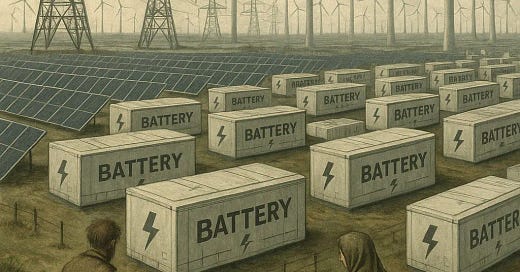HEADLINE: “Looming US Battery Company Shutdown Imperils Aussie Net Zero Push”, Essay by Eric Worrall
“… If Powin LLC’s present business circumstances do not improve, it is currently anticipated that a layoff will occur on or before 28 July 2025 …”
Looming US Battery Company Shutdown Imperils Aussie Net Zero Push
Essay by Eric Worrall
“… If Powin LLC’s present business circumstances do not improve, it is currently anticipated that a layoff will occur on or before 28 July 2025 …”
Main supplier to Australia’s most powerful big battery warns it may go out of business
Giles Parkinson
Jun 3, 2025The US-based Powin, the main supplier to the Waratah Super Battery in New South Wales, the most powerful big battery to be built in the country, has warned that it may go out of business and be forced to lay off all its staff within weeks.
Powin has filed a letter with regulatory authorities in the US state of Oregon, where it is based, warning that it may be forced to shut down by July 28, or earlier, if business conditions do not improve.
In a letter dated May 29, Powin warns that “due to unforeseen business circumstances, Powin LLC’s situation, as well as the economy generally, remain dynamic and fluid.”
The letter, signed by Powin’s VP for human resources, Scott Getman, says. “If Powin LLC’s present business circumstances do not improve, it is currently anticipated that a layoff will occur on or before 28 July 2025.
…
It said: “Both Waratah Super Battery and Ulinda Park are well advanced, with 100% of Powin battery packs installed and commissioning activities progressing. Waratah Super Battery currently has around 240 MW available and is progressing through hold point testing.
…
“Akaysha has mobilised its deep in-house engineering, delivery, asset management, and market operations teams to mitigate any risks to seamless project delivery.
…
Powin is the main supplier for the big battery which is supposed to replace Eraring Coal Plant. The NSW government last year agreed to pay a billion dollars to Eraring to stay open until 2027, to stabilise the New South Wales state grid.
There were early warning signs of Powin’s precarious financial situation, which somehow appear to have been overlooked during the Waratah project’s due diligence. It took me 2 minutes of googling to discover that in 2023 a Chinese supplier took Powin to court for allegedly not paying their bills.
…
Although the company raised US$200 million financing through a credit facility with influential US investment firm Kohlberg Kravis Roberts & Co (KKR) as recently as Q3 of last year, Powin cited “unforeseen business circumstances” impacting its performance in its notice letter last week.
Late last year, one of Powin’s battery suppliers, CATL, filed a complaint in a US court for alleged non-payment for battery cells supplied during 2023. The Chinese battery manufacturer claimed the US integrator had not paid for two shipments of cells, worth CNY310 million (US$44 million).
Though the company has pushed into international markets including Australia, Europe and Latin America, Powin’s announcement comes amid a backdrop of uncertainty for the US battery storage industry, driven by US federal policy announcements including tariffs and the possible repeal of tax credit incentives for clean energy manufacturing and deployment via the budget reconciliation bill.
…
Despite this apparent cashflow difficulty Powin was until recently able to secure access to serious loans. In October 2024, Powin announced they had secured a $200 million “revolving credit facility” from investment giant KKR. Perhaps KKR were expecting Powin’s fortunes to improve after the November 2024 election.
Green energy pundits are already busy blaming Trump’s tariffs for Powin’s difficulties. My opinion is, given the economic turmoil of the last five years, perhaps Powin should have paid more attention to managing the risk of signing fixed price procurement and delivery contracts.
There seem to be hints that Powin might have secured federal grants and moneys, but I didn’t find anything definitive. Powin was certainly named in Biden era documents as a strategic green energy provider. If anyone has the patience to go dumpster diving through Powin public company statements and Biden administration online records, please post anything you find in comments.
The Waratah Super Battery when completed will have a capacity of 1680MWh – equivalent to just over half an hour of Eraring Coal Plant output when fully charged. Given wind droughts covering the entire continent of Australia have occurred at least twice in the last five years, only the engineering challenged could believe a battery of this capacity is an adequate replacement for a plant capable of delivering a continuous 2880MW.
Even though Waratah Super Battery spokespeople are claiming “100% of Powin battery packs” have been installed, it must be a deeply uncomfortable situation to have spent hundreds of millions of dollars on a product which is meant to serve as the backbone of an entire state’s electricity grid, only to see the supplier start cease trading proceedings. You can’t pursue a warranty claim against a company which no longer exists. Having said that, Akaysha Energy, which is managing the Waratah battery project, has promised to mobilise “… its deep in-house engineering, delivery, asset management, and market operations teams to mitigate any risks to seamless project delivery.”
BOTTOMLINE: “Even though Waratah Super Battery spokespeople are claiming “100% of Powin battery packs” have been installed, it must be a deeply uncomfortable situation to have spent hundreds of millions of dollars on a product which is meant to serve as the backbone of an entire state’s electricity grid, only to see the supplier start cease trading proceedings. You can’t pursue a warranty claim against a company which no longer exists.”





Kind of a normal story in the renewable world.